Globalisation of Juventus Brand: Financial Analysis and Engagement
VerifiedAdded on 2022/11/27
|67
|18271
|242
Project
AI Summary
This research paper investigates the globalisation of the Juventus brand, focusing on the interplay between financial performance and fan engagement. The study begins with an introduction to globalisation in football, highlighting its impact on player transfers, club finances, and fan bases. A comprehensive literature review explores the perception of supporters, the effects of globalisation on football clubs, and the relationship between globalisation and trade. The methodology section details the research approach, design, and data collection methods, including primary research through questionnaires. The results and discussion chapter presents the findings of the analysis, including descriptive statistics, correlation analysis, and regression analysis. The conclusion links the findings to the research objectives and offers recommendations for future research, acknowledging the limitations of the study. The paper aims to understand how Juventus has navigated the challenges and opportunities of globalisation, particularly in terms of financial success and maintaining a strong fan base.
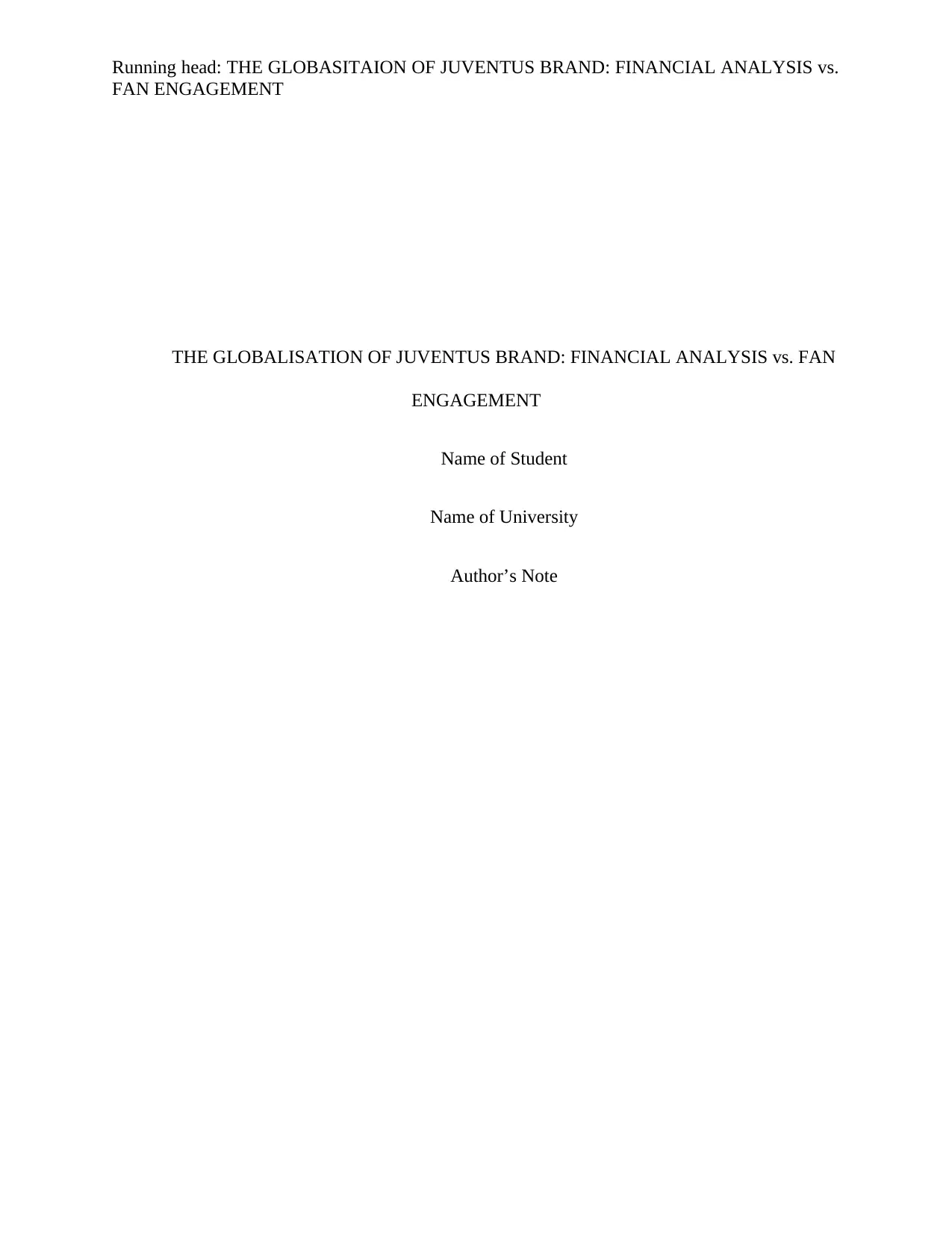
Running head: THE GLOBASITAION OF JUVENTUS BRAND: FINANCIAL ANALYSIS vs.
FAN ENGAGEMENT
THE GLOBALISATION OF JUVENTUS BRAND: FINANCIAL ANALYSIS vs. FAN
ENGAGEMENT
Name of Student
Name of University
Author’s Note
FAN ENGAGEMENT
THE GLOBALISATION OF JUVENTUS BRAND: FINANCIAL ANALYSIS vs. FAN
ENGAGEMENT
Name of Student
Name of University
Author’s Note
Paraphrase This Document
Need a fresh take? Get an instant paraphrase of this document with our AI Paraphraser
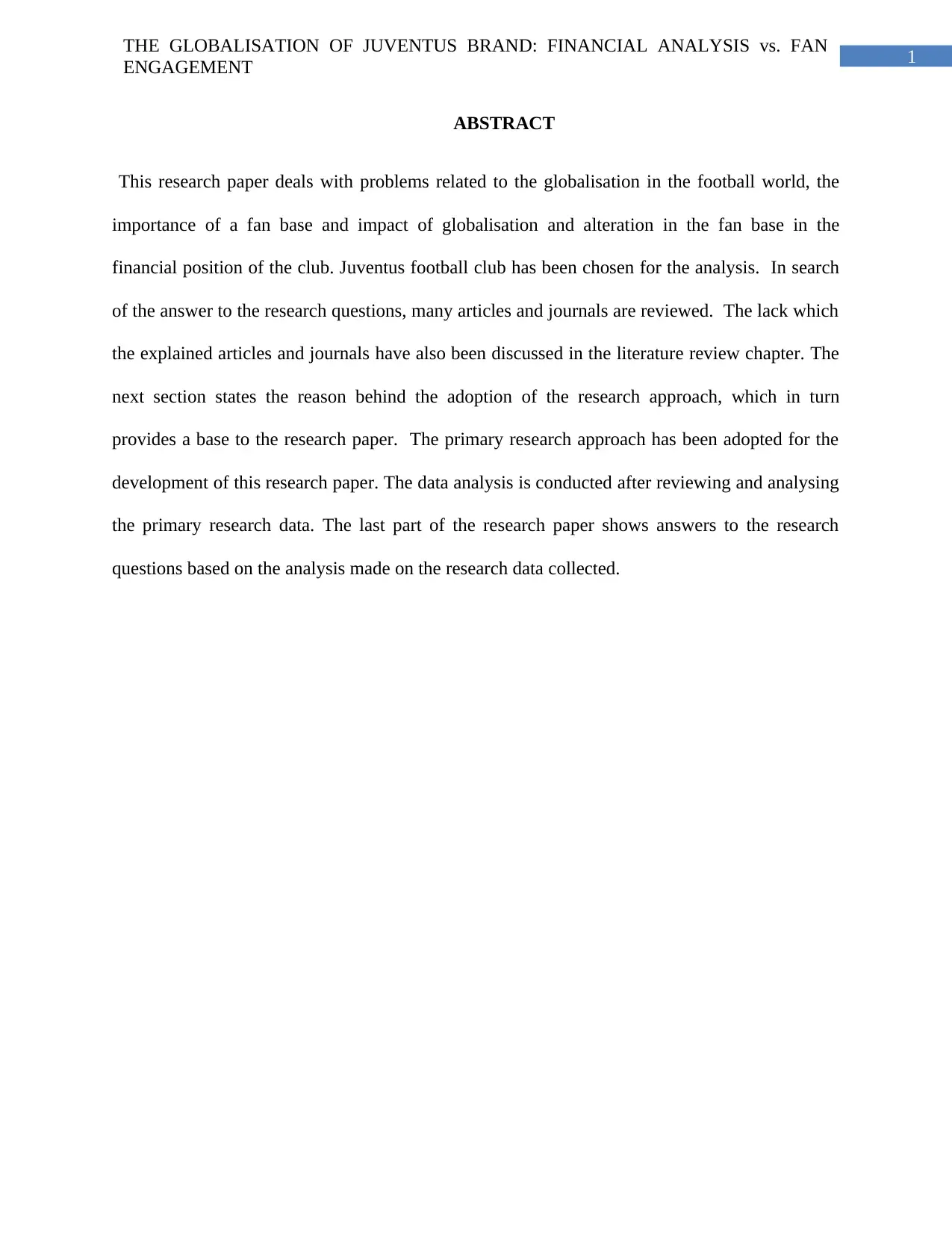
1
THE GLOBALISATION OF JUVENTUS BRAND: FINANCIAL ANALYSIS vs. FAN
ENGAGEMENT
ABSTRACT
This research paper deals with problems related to the globalisation in the football world, the
importance of a fan base and impact of globalisation and alteration in the fan base in the
financial position of the club. Juventus football club has been chosen for the analysis. In search
of the answer to the research questions, many articles and journals are reviewed. The lack which
the explained articles and journals have also been discussed in the literature review chapter. The
next section states the reason behind the adoption of the research approach, which in turn
provides a base to the research paper. The primary research approach has been adopted for the
development of this research paper. The data analysis is conducted after reviewing and analysing
the primary research data. The last part of the research paper shows answers to the research
questions based on the analysis made on the research data collected.
THE GLOBALISATION OF JUVENTUS BRAND: FINANCIAL ANALYSIS vs. FAN
ENGAGEMENT
ABSTRACT
This research paper deals with problems related to the globalisation in the football world, the
importance of a fan base and impact of globalisation and alteration in the fan base in the
financial position of the club. Juventus football club has been chosen for the analysis. In search
of the answer to the research questions, many articles and journals are reviewed. The lack which
the explained articles and journals have also been discussed in the literature review chapter. The
next section states the reason behind the adoption of the research approach, which in turn
provides a base to the research paper. The primary research approach has been adopted for the
development of this research paper. The data analysis is conducted after reviewing and analysing
the primary research data. The last part of the research paper shows answers to the research
questions based on the analysis made on the research data collected.
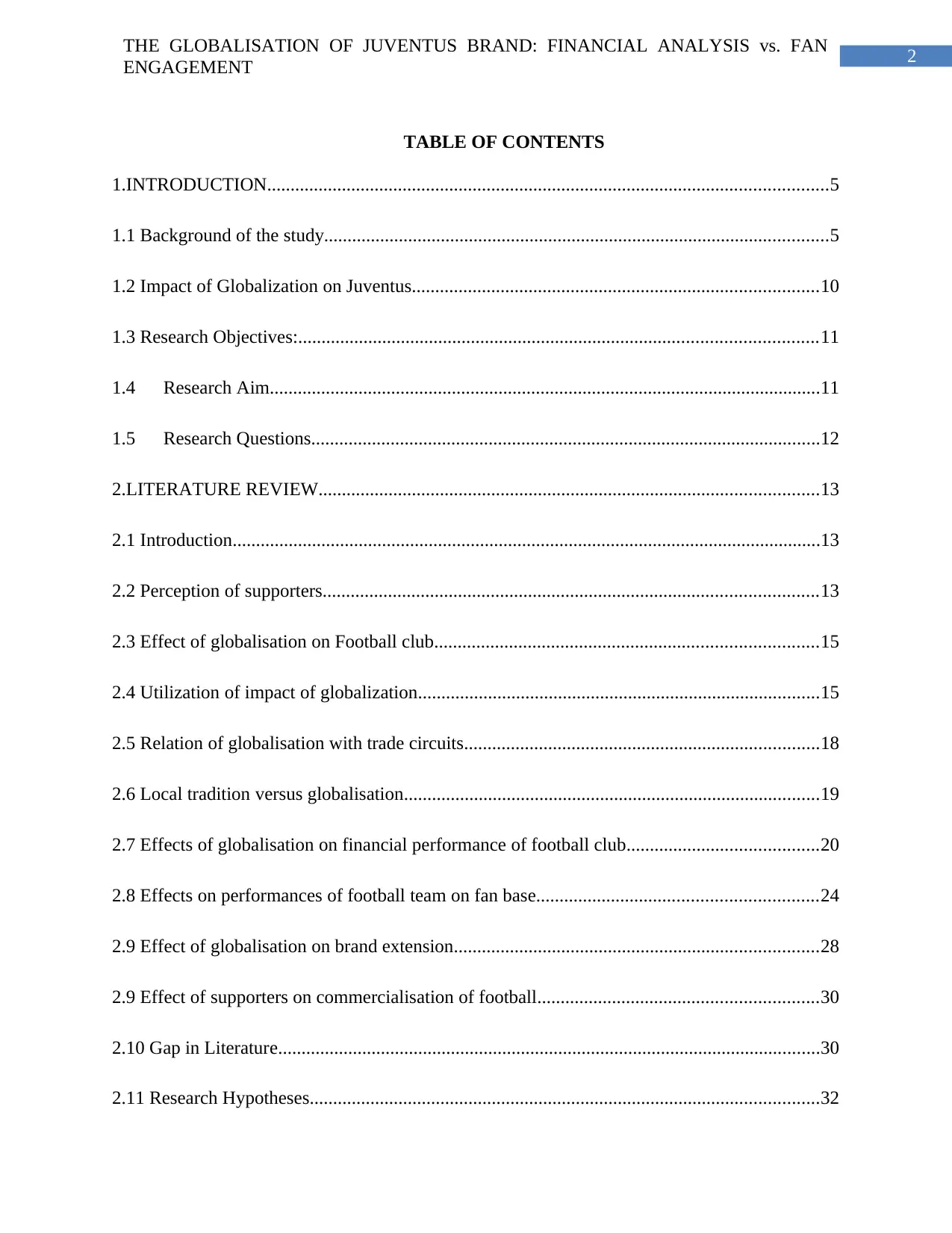
2
THE GLOBALISATION OF JUVENTUS BRAND: FINANCIAL ANALYSIS vs. FAN
ENGAGEMENT
TABLE OF CONTENTS
1.INTRODUCTION........................................................................................................................5
1.1 Background of the study............................................................................................................5
1.2 Impact of Globalization on Juventus.......................................................................................10
1.3 Research Objectives:...............................................................................................................11
1.4 Research Aim......................................................................................................................11
1.5 Research Questions.............................................................................................................12
2.LITERATURE REVIEW...........................................................................................................13
2.1 Introduction..............................................................................................................................13
2.2 Perception of supporters..........................................................................................................13
2.3 Effect of globalisation on Football club..................................................................................15
2.4 Utilization of impact of globalization......................................................................................15
2.5 Relation of globalisation with trade circuits............................................................................18
2.6 Local tradition versus globalisation.........................................................................................19
2.7 Effects of globalisation on financial performance of football club.........................................20
2.8 Effects on performances of football team on fan base............................................................24
2.9 Effect of globalisation on brand extension..............................................................................28
2.9 Effect of supporters on commercialisation of football............................................................30
2.10 Gap in Literature....................................................................................................................30
2.11 Research Hypotheses.............................................................................................................32
THE GLOBALISATION OF JUVENTUS BRAND: FINANCIAL ANALYSIS vs. FAN
ENGAGEMENT
TABLE OF CONTENTS
1.INTRODUCTION........................................................................................................................5
1.1 Background of the study............................................................................................................5
1.2 Impact of Globalization on Juventus.......................................................................................10
1.3 Research Objectives:...............................................................................................................11
1.4 Research Aim......................................................................................................................11
1.5 Research Questions.............................................................................................................12
2.LITERATURE REVIEW...........................................................................................................13
2.1 Introduction..............................................................................................................................13
2.2 Perception of supporters..........................................................................................................13
2.3 Effect of globalisation on Football club..................................................................................15
2.4 Utilization of impact of globalization......................................................................................15
2.5 Relation of globalisation with trade circuits............................................................................18
2.6 Local tradition versus globalisation.........................................................................................19
2.7 Effects of globalisation on financial performance of football club.........................................20
2.8 Effects on performances of football team on fan base............................................................24
2.9 Effect of globalisation on brand extension..............................................................................28
2.9 Effect of supporters on commercialisation of football............................................................30
2.10 Gap in Literature....................................................................................................................30
2.11 Research Hypotheses.............................................................................................................32
⊘ This is a preview!⊘
Do you want full access?
Subscribe today to unlock all pages.

Trusted by 1+ million students worldwide
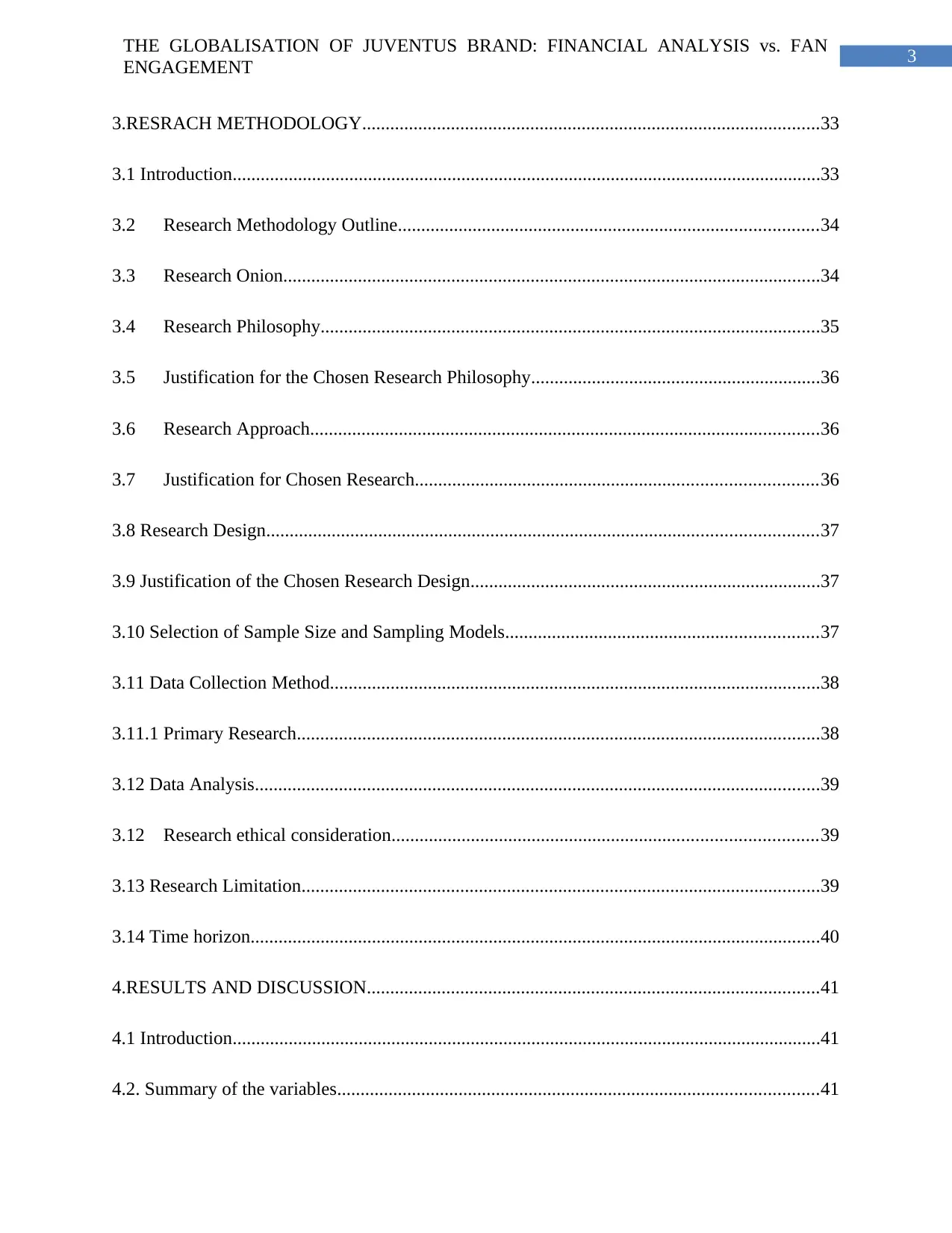
3
THE GLOBALISATION OF JUVENTUS BRAND: FINANCIAL ANALYSIS vs. FAN
ENGAGEMENT
3.RESRACH METHODOLOGY..................................................................................................33
3.1 Introduction..............................................................................................................................33
3.2 Research Methodology Outline..........................................................................................34
3.3 Research Onion...................................................................................................................34
3.4 Research Philosophy...........................................................................................................35
3.5 Justification for the Chosen Research Philosophy..............................................................36
3.6 Research Approach.............................................................................................................36
3.7 Justification for Chosen Research......................................................................................36
3.8 Research Design......................................................................................................................37
3.9 Justification of the Chosen Research Design...........................................................................37
3.10 Selection of Sample Size and Sampling Models...................................................................37
3.11 Data Collection Method.........................................................................................................38
3.11.1 Primary Research................................................................................................................38
3.12 Data Analysis.........................................................................................................................39
3.12 Research ethical consideration...........................................................................................39
3.13 Research Limitation...............................................................................................................39
3.14 Time horizon..........................................................................................................................40
4.RESULTS AND DISCUSSION.................................................................................................41
4.1 Introduction..............................................................................................................................41
4.2. Summary of the variables.......................................................................................................41
THE GLOBALISATION OF JUVENTUS BRAND: FINANCIAL ANALYSIS vs. FAN
ENGAGEMENT
3.RESRACH METHODOLOGY..................................................................................................33
3.1 Introduction..............................................................................................................................33
3.2 Research Methodology Outline..........................................................................................34
3.3 Research Onion...................................................................................................................34
3.4 Research Philosophy...........................................................................................................35
3.5 Justification for the Chosen Research Philosophy..............................................................36
3.6 Research Approach.............................................................................................................36
3.7 Justification for Chosen Research......................................................................................36
3.8 Research Design......................................................................................................................37
3.9 Justification of the Chosen Research Design...........................................................................37
3.10 Selection of Sample Size and Sampling Models...................................................................37
3.11 Data Collection Method.........................................................................................................38
3.11.1 Primary Research................................................................................................................38
3.12 Data Analysis.........................................................................................................................39
3.12 Research ethical consideration...........................................................................................39
3.13 Research Limitation...............................................................................................................39
3.14 Time horizon..........................................................................................................................40
4.RESULTS AND DISCUSSION.................................................................................................41
4.1 Introduction..............................................................................................................................41
4.2. Summary of the variables.......................................................................................................41
Paraphrase This Document
Need a fresh take? Get an instant paraphrase of this document with our AI Paraphraser
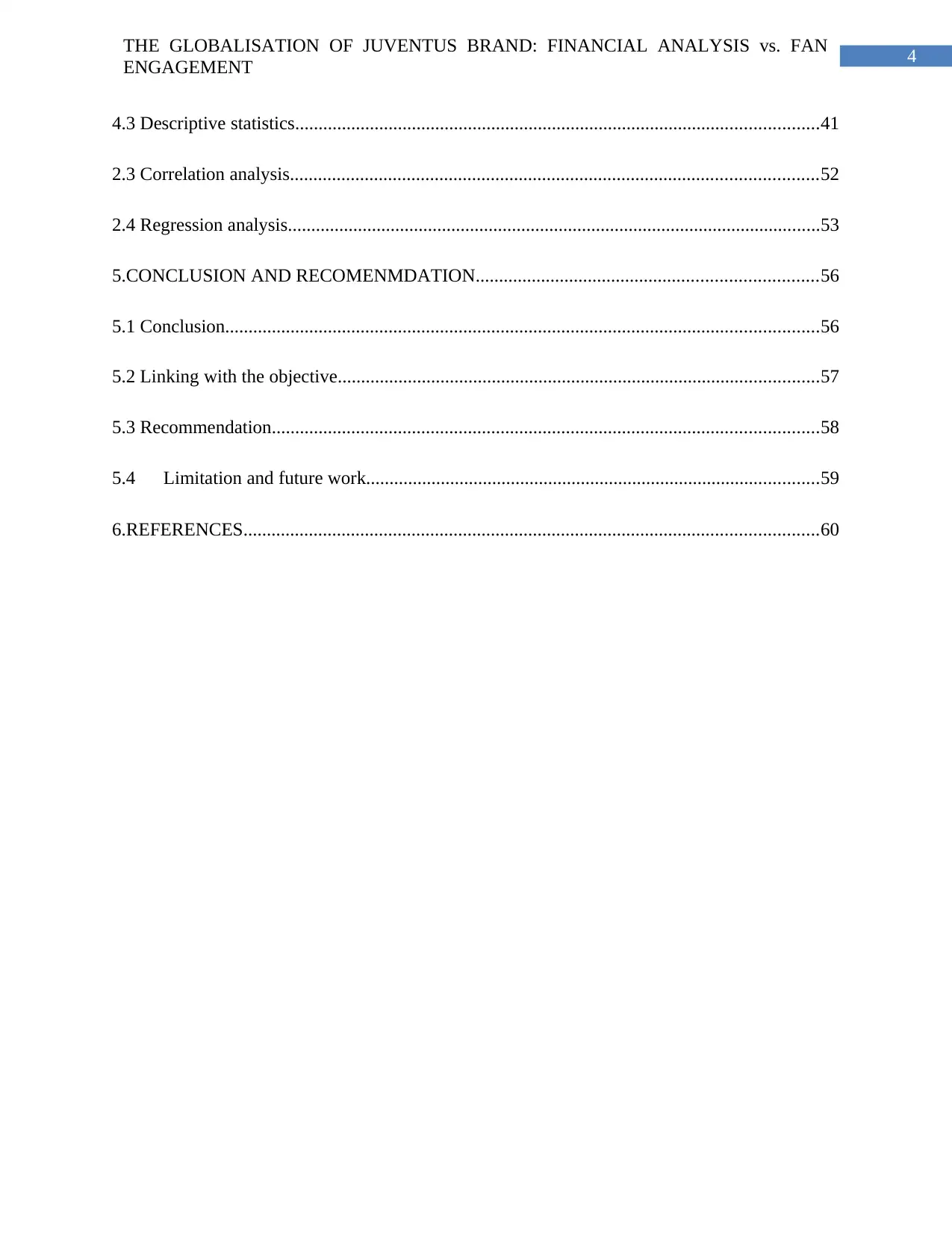
4
THE GLOBALISATION OF JUVENTUS BRAND: FINANCIAL ANALYSIS vs. FAN
ENGAGEMENT
4.3 Descriptive statistics................................................................................................................41
2.3 Correlation analysis.................................................................................................................52
2.4 Regression analysis..................................................................................................................53
5.CONCLUSION AND RECOMENMDATION.........................................................................56
5.1 Conclusion...............................................................................................................................56
5.2 Linking with the objective.......................................................................................................57
5.3 Recommendation.....................................................................................................................58
5.4 Limitation and future work.................................................................................................59
6.REFERENCES...........................................................................................................................60
THE GLOBALISATION OF JUVENTUS BRAND: FINANCIAL ANALYSIS vs. FAN
ENGAGEMENT
4.3 Descriptive statistics................................................................................................................41
2.3 Correlation analysis.................................................................................................................52
2.4 Regression analysis..................................................................................................................53
5.CONCLUSION AND RECOMENMDATION.........................................................................56
5.1 Conclusion...............................................................................................................................56
5.2 Linking with the objective.......................................................................................................57
5.3 Recommendation.....................................................................................................................58
5.4 Limitation and future work.................................................................................................59
6.REFERENCES...........................................................................................................................60
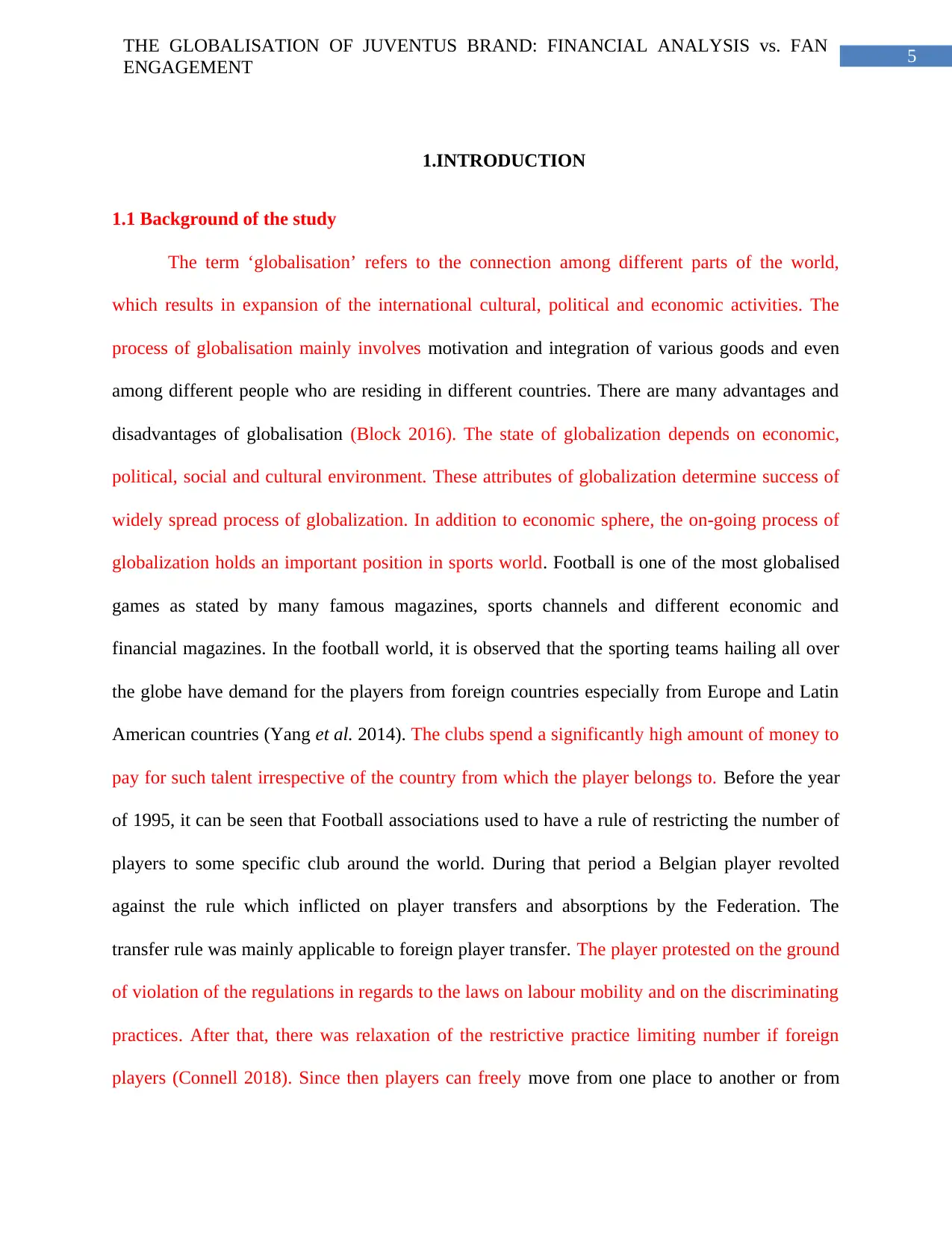
5
THE GLOBALISATION OF JUVENTUS BRAND: FINANCIAL ANALYSIS vs. FAN
ENGAGEMENT
1.INTRODUCTION
1.1 Background of the study
The term ‘globalisation’ refers to the connection among different parts of the world,
which results in expansion of the international cultural, political and economic activities. The
process of globalisation mainly involves motivation and integration of various goods and even
among different people who are residing in different countries. There are many advantages and
disadvantages of globalisation (Block 2016). The state of globalization depends on economic,
political, social and cultural environment. These attributes of globalization determine success of
widely spread process of globalization. In addition to economic sphere, the on-going process of
globalization holds an important position in sports world. Football is one of the most globalised
games as stated by many famous magazines, sports channels and different economic and
financial magazines. In the football world, it is observed that the sporting teams hailing all over
the globe have demand for the players from foreign countries especially from Europe and Latin
American countries (Yang et al. 2014). The clubs spend a significantly high amount of money to
pay for such talent irrespective of the country from which the player belongs to. Before the year
of 1995, it can be seen that Football associations used to have a rule of restricting the number of
players to some specific club around the world. During that period a Belgian player revolted
against the rule which inflicted on player transfers and absorptions by the Federation. The
transfer rule was mainly applicable to foreign player transfer. The player protested on the ground
of violation of the regulations in regards to the laws on labour mobility and on the discriminating
practices. After that, there was relaxation of the restrictive practice limiting number if foreign
players (Connell 2018). Since then players can freely move from one place to another or from
THE GLOBALISATION OF JUVENTUS BRAND: FINANCIAL ANALYSIS vs. FAN
ENGAGEMENT
1.INTRODUCTION
1.1 Background of the study
The term ‘globalisation’ refers to the connection among different parts of the world,
which results in expansion of the international cultural, political and economic activities. The
process of globalisation mainly involves motivation and integration of various goods and even
among different people who are residing in different countries. There are many advantages and
disadvantages of globalisation (Block 2016). The state of globalization depends on economic,
political, social and cultural environment. These attributes of globalization determine success of
widely spread process of globalization. In addition to economic sphere, the on-going process of
globalization holds an important position in sports world. Football is one of the most globalised
games as stated by many famous magazines, sports channels and different economic and
financial magazines. In the football world, it is observed that the sporting teams hailing all over
the globe have demand for the players from foreign countries especially from Europe and Latin
American countries (Yang et al. 2014). The clubs spend a significantly high amount of money to
pay for such talent irrespective of the country from which the player belongs to. Before the year
of 1995, it can be seen that Football associations used to have a rule of restricting the number of
players to some specific club around the world. During that period a Belgian player revolted
against the rule which inflicted on player transfers and absorptions by the Federation. The
transfer rule was mainly applicable to foreign player transfer. The player protested on the ground
of violation of the regulations in regards to the laws on labour mobility and on the discriminating
practices. After that, there was relaxation of the restrictive practice limiting number if foreign
players (Connell 2018). Since then players can freely move from one place to another or from
⊘ This is a preview!⊘
Do you want full access?
Subscribe today to unlock all pages.

Trusted by 1+ million students worldwide
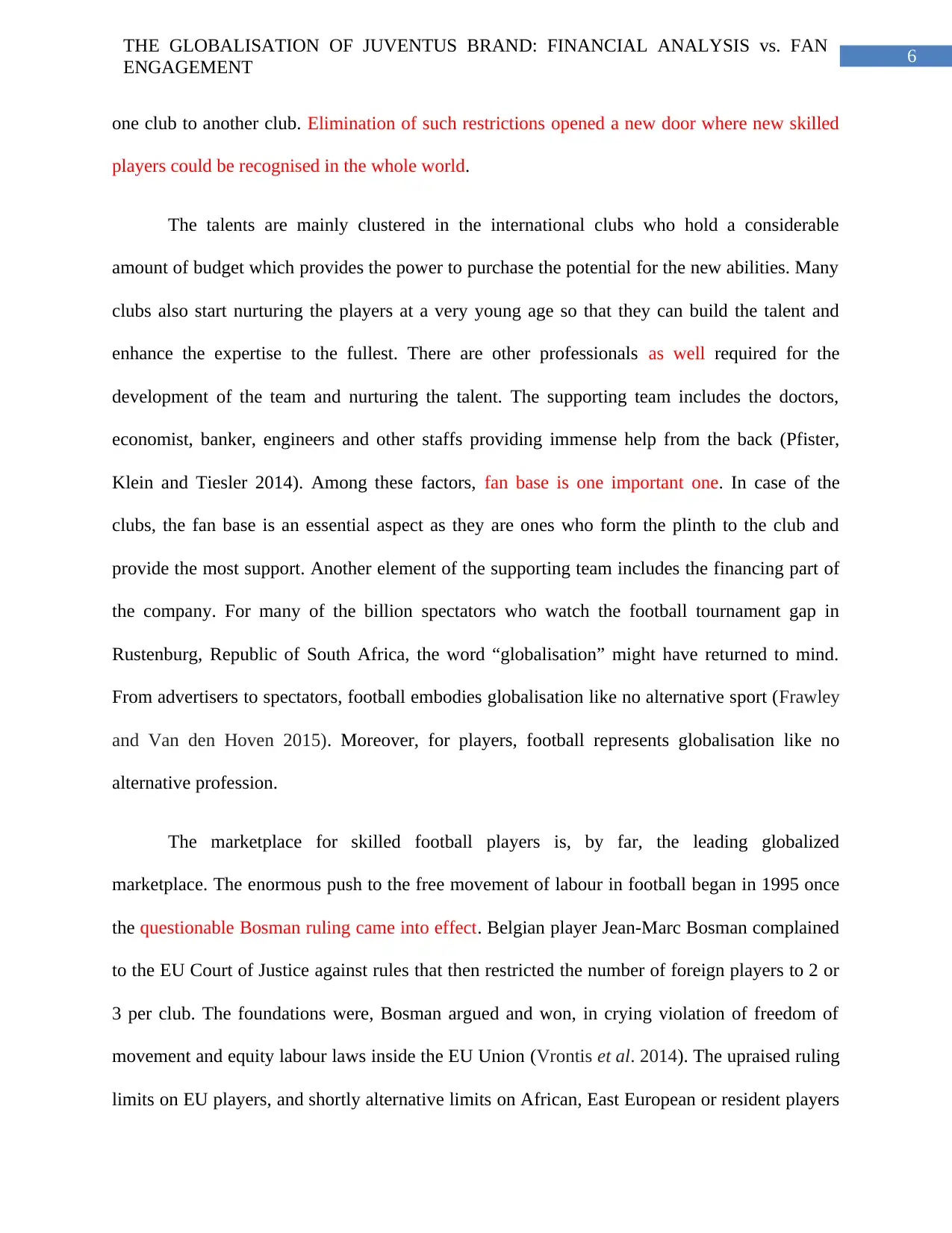
6
THE GLOBALISATION OF JUVENTUS BRAND: FINANCIAL ANALYSIS vs. FAN
ENGAGEMENT
one club to another club. Elimination of such restrictions opened a new door where new skilled
players could be recognised in the whole world.
The talents are mainly clustered in the international clubs who hold a considerable
amount of budget which provides the power to purchase the potential for the new abilities. Many
clubs also start nurturing the players at a very young age so that they can build the talent and
enhance the expertise to the fullest. There are other professionals as well required for the
development of the team and nurturing the talent. The supporting team includes the doctors,
economist, banker, engineers and other staffs providing immense help from the back (Pfister,
Klein and Tiesler 2014). Among these factors, fan base is one important one. In case of the
clubs, the fan base is an essential aspect as they are ones who form the plinth to the club and
provide the most support. Another element of the supporting team includes the financing part of
the company. For many of the billion spectators who watch the football tournament gap in
Rustenburg, Republic of South Africa, the word “globalisation” might have returned to mind.
From advertisers to spectators, football embodies globalisation like no alternative sport (Frawley
and Van den Hoven 2015). Moreover, for players, football represents globalisation like no
alternative profession.
The marketplace for skilled football players is, by far, the leading globalized
marketplace. The enormous push to the free movement of labour in football began in 1995 once
the questionable Bosman ruling came into effect. Belgian player Jean-Marc Bosman complained
to the EU Court of Justice against rules that then restricted the number of foreign players to 2 or
3 per club. The foundations were, Bosman argued and won, in crying violation of freedom of
movement and equity labour laws inside the EU Union (Vrontis et al. 2014). The upraised ruling
limits on EU players, and shortly alternative limits on African, East European or resident players
THE GLOBALISATION OF JUVENTUS BRAND: FINANCIAL ANALYSIS vs. FAN
ENGAGEMENT
one club to another club. Elimination of such restrictions opened a new door where new skilled
players could be recognised in the whole world.
The talents are mainly clustered in the international clubs who hold a considerable
amount of budget which provides the power to purchase the potential for the new abilities. Many
clubs also start nurturing the players at a very young age so that they can build the talent and
enhance the expertise to the fullest. There are other professionals as well required for the
development of the team and nurturing the talent. The supporting team includes the doctors,
economist, banker, engineers and other staffs providing immense help from the back (Pfister,
Klein and Tiesler 2014). Among these factors, fan base is one important one. In case of the
clubs, the fan base is an essential aspect as they are ones who form the plinth to the club and
provide the most support. Another element of the supporting team includes the financing part of
the company. For many of the billion spectators who watch the football tournament gap in
Rustenburg, Republic of South Africa, the word “globalisation” might have returned to mind.
From advertisers to spectators, football embodies globalisation like no alternative sport (Frawley
and Van den Hoven 2015). Moreover, for players, football represents globalisation like no
alternative profession.
The marketplace for skilled football players is, by far, the leading globalized
marketplace. The enormous push to the free movement of labour in football began in 1995 once
the questionable Bosman ruling came into effect. Belgian player Jean-Marc Bosman complained
to the EU Court of Justice against rules that then restricted the number of foreign players to 2 or
3 per club. The foundations were, Bosman argued and won, in crying violation of freedom of
movement and equity labour laws inside the EU Union (Vrontis et al. 2014). The upraised ruling
limits on EU players, and shortly alternative limits on African, East European or resident players
Paraphrase This Document
Need a fresh take? Get an instant paraphrase of this document with our AI Paraphraser
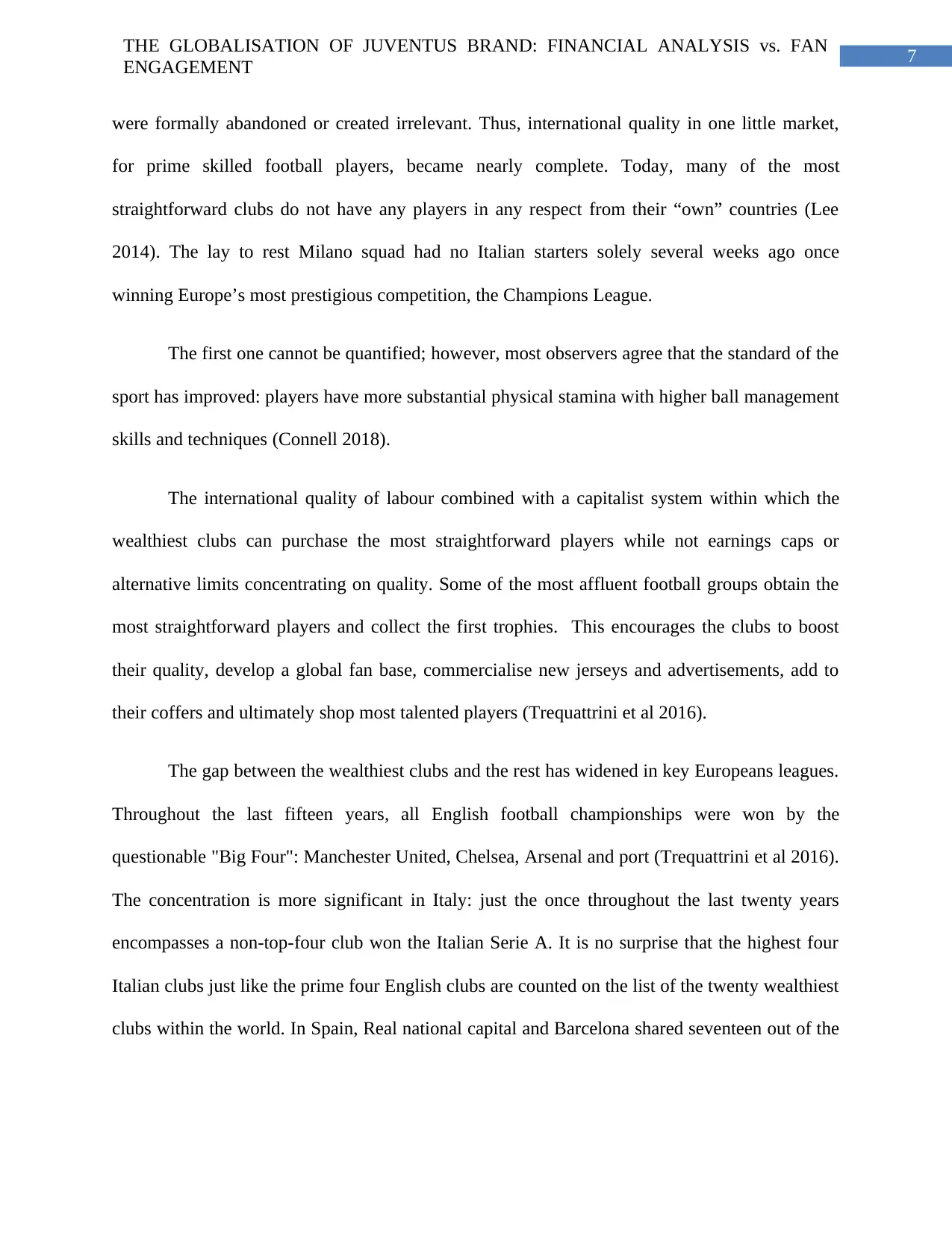
7
THE GLOBALISATION OF JUVENTUS BRAND: FINANCIAL ANALYSIS vs. FAN
ENGAGEMENT
were formally abandoned or created irrelevant. Thus, international quality in one little market,
for prime skilled football players, became nearly complete. Today, many of the most
straightforward clubs do not have any players in any respect from their “own” countries (Lee
2014). The lay to rest Milano squad had no Italian starters solely several weeks ago once
winning Europe’s most prestigious competition, the Champions League.
The first one cannot be quantified; however, most observers agree that the standard of the
sport has improved: players have more substantial physical stamina with higher ball management
skills and techniques (Connell 2018).
The international quality of labour combined with a capitalist system within which the
wealthiest clubs can purchase the most straightforward players while not earnings caps or
alternative limits concentrating on quality. Some of the most affluent football groups obtain the
most straightforward players and collect the first trophies. This encourages the clubs to boost
their quality, develop a global fan base, commercialise new jerseys and advertisements, add to
their coffers and ultimately shop most talented players (Trequattrini et al 2016).
The gap between the wealthiest clubs and the rest has widened in key Europeans leagues.
Throughout the last fifteen years, all English football championships were won by the
questionable "Big Four": Manchester United, Chelsea, Arsenal and port (Trequattrini et al 2016).
The concentration is more significant in Italy: just the once throughout the last twenty years
encompasses a non-top-four club won the Italian Serie A. It is no surprise that the highest four
Italian clubs just like the prime four English clubs are counted on the list of the twenty wealthiest
clubs within the world. In Spain, Real national capital and Barcelona shared seventeen out of the
THE GLOBALISATION OF JUVENTUS BRAND: FINANCIAL ANALYSIS vs. FAN
ENGAGEMENT
were formally abandoned or created irrelevant. Thus, international quality in one little market,
for prime skilled football players, became nearly complete. Today, many of the most
straightforward clubs do not have any players in any respect from their “own” countries (Lee
2014). The lay to rest Milano squad had no Italian starters solely several weeks ago once
winning Europe’s most prestigious competition, the Champions League.
The first one cannot be quantified; however, most observers agree that the standard of the
sport has improved: players have more substantial physical stamina with higher ball management
skills and techniques (Connell 2018).
The international quality of labour combined with a capitalist system within which the
wealthiest clubs can purchase the most straightforward players while not earnings caps or
alternative limits concentrating on quality. Some of the most affluent football groups obtain the
most straightforward players and collect the first trophies. This encourages the clubs to boost
their quality, develop a global fan base, commercialise new jerseys and advertisements, add to
their coffers and ultimately shop most talented players (Trequattrini et al 2016).
The gap between the wealthiest clubs and the rest has widened in key Europeans leagues.
Throughout the last fifteen years, all English football championships were won by the
questionable "Big Four": Manchester United, Chelsea, Arsenal and port (Trequattrini et al 2016).
The concentration is more significant in Italy: just the once throughout the last twenty years
encompasses a non-top-four club won the Italian Serie A. It is no surprise that the highest four
Italian clubs just like the prime four English clubs are counted on the list of the twenty wealthiest
clubs within the world. In Spain, Real national capital and Barcelona shared seventeen out of the
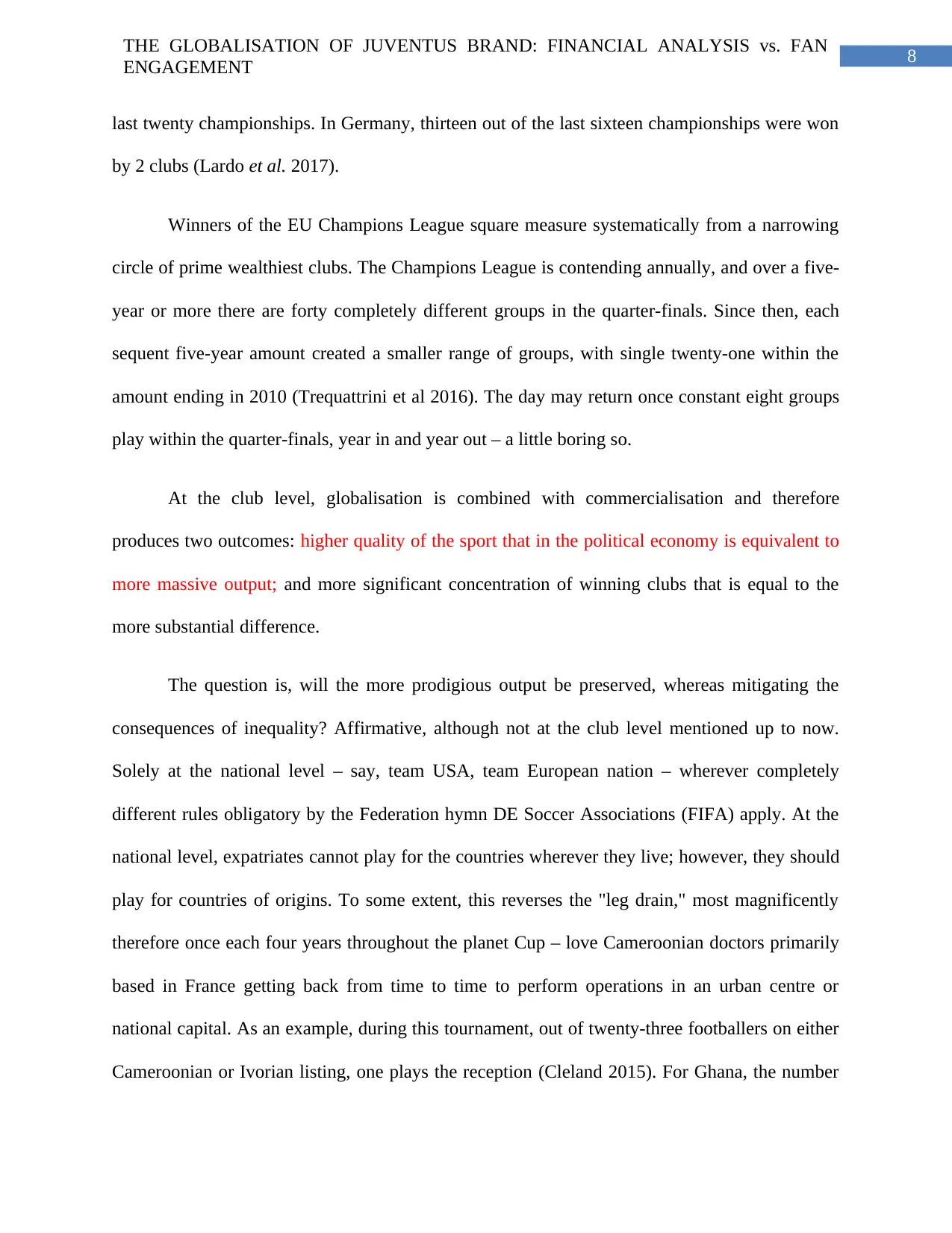
8
THE GLOBALISATION OF JUVENTUS BRAND: FINANCIAL ANALYSIS vs. FAN
ENGAGEMENT
last twenty championships. In Germany, thirteen out of the last sixteen championships were won
by 2 clubs (Lardo et al. 2017).
Winners of the EU Champions League square measure systematically from a narrowing
circle of prime wealthiest clubs. The Champions League is contending annually, and over a five-
year or more there are forty completely different groups in the quarter-finals. Since then, each
sequent five-year amount created a smaller range of groups, with single twenty-one within the
amount ending in 2010 (Trequattrini et al 2016). The day may return once constant eight groups
play within the quarter-finals, year in and year out – a little boring so.
At the club level, globalisation is combined with commercialisation and therefore
produces two outcomes: higher quality of the sport that in the political economy is equivalent to
more massive output; and more significant concentration of winning clubs that is equal to the
more substantial difference.
The question is, will the more prodigious output be preserved, whereas mitigating the
consequences of inequality? Affirmative, although not at the club level mentioned up to now.
Solely at the national level – say, team USA, team European nation – wherever completely
different rules obligatory by the Federation hymn DE Soccer Associations (FIFA) apply. At the
national level, expatriates cannot play for the countries wherever they live; however, they should
play for countries of origins. To some extent, this reverses the "leg drain," most magnificently
therefore once each four years throughout the planet Cup – love Cameroonian doctors primarily
based in France getting back from time to time to perform operations in an urban centre or
national capital. As an example, during this tournament, out of twenty-three footballers on either
Cameroonian or Ivorian listing, one plays the reception (Cleland 2015). For Ghana, the number
THE GLOBALISATION OF JUVENTUS BRAND: FINANCIAL ANALYSIS vs. FAN
ENGAGEMENT
last twenty championships. In Germany, thirteen out of the last sixteen championships were won
by 2 clubs (Lardo et al. 2017).
Winners of the EU Champions League square measure systematically from a narrowing
circle of prime wealthiest clubs. The Champions League is contending annually, and over a five-
year or more there are forty completely different groups in the quarter-finals. Since then, each
sequent five-year amount created a smaller range of groups, with single twenty-one within the
amount ending in 2010 (Trequattrini et al 2016). The day may return once constant eight groups
play within the quarter-finals, year in and year out – a little boring so.
At the club level, globalisation is combined with commercialisation and therefore
produces two outcomes: higher quality of the sport that in the political economy is equivalent to
more massive output; and more significant concentration of winning clubs that is equal to the
more substantial difference.
The question is, will the more prodigious output be preserved, whereas mitigating the
consequences of inequality? Affirmative, although not at the club level mentioned up to now.
Solely at the national level – say, team USA, team European nation – wherever completely
different rules obligatory by the Federation hymn DE Soccer Associations (FIFA) apply. At the
national level, expatriates cannot play for the countries wherever they live; however, they should
play for countries of origins. To some extent, this reverses the "leg drain," most magnificently
therefore once each four years throughout the planet Cup – love Cameroonian doctors primarily
based in France getting back from time to time to perform operations in an urban centre or
national capital. As an example, during this tournament, out of twenty-three footballers on either
Cameroonian or Ivorian listing, one plays the reception (Cleland 2015). For Ghana, the number
⊘ This is a preview!⊘
Do you want full access?
Subscribe today to unlock all pages.

Trusted by 1+ million students worldwide
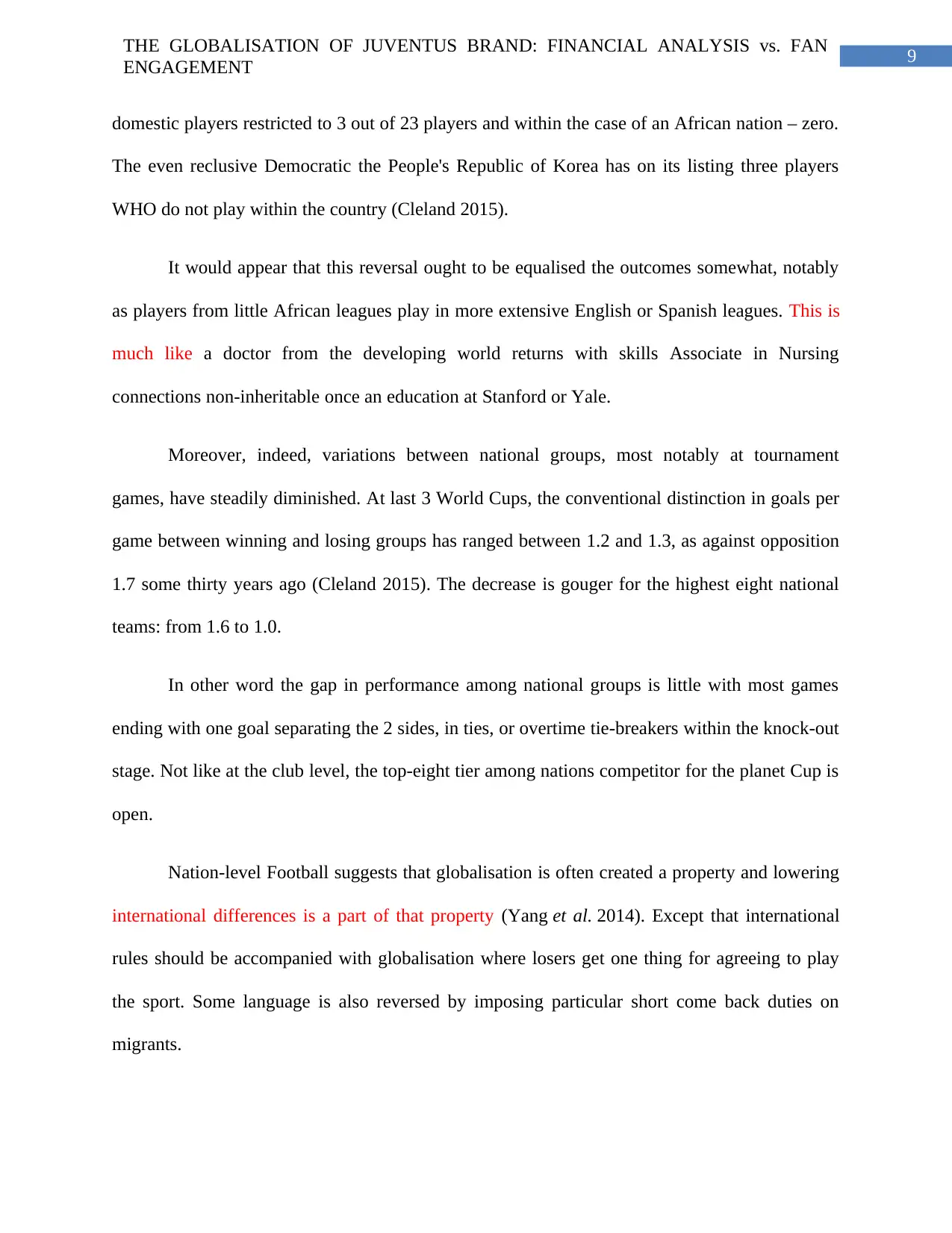
9
THE GLOBALISATION OF JUVENTUS BRAND: FINANCIAL ANALYSIS vs. FAN
ENGAGEMENT
domestic players restricted to 3 out of 23 players and within the case of an African nation – zero.
The even reclusive Democratic the People's Republic of Korea has on its listing three players
WHO do not play within the country (Cleland 2015).
It would appear that this reversal ought to be equalised the outcomes somewhat, notably
as players from little African leagues play in more extensive English or Spanish leagues. This is
much like a doctor from the developing world returns with skills Associate in Nursing
connections non-inheritable once an education at Stanford or Yale.
Moreover, indeed, variations between national groups, most notably at tournament
games, have steadily diminished. At last 3 World Cups, the conventional distinction in goals per
game between winning and losing groups has ranged between 1.2 and 1.3, as against opposition
1.7 some thirty years ago (Cleland 2015). The decrease is gouger for the highest eight national
teams: from 1.6 to 1.0.
In other word the gap in performance among national groups is little with most games
ending with one goal separating the 2 sides, in ties, or overtime tie-breakers within the knock-out
stage. Not like at the club level, the top-eight tier among nations competitor for the planet Cup is
open.
Nation-level Football suggests that globalisation is often created a property and lowering
international differences is a part of that property (Yang et al. 2014). Except that international
rules should be accompanied with globalisation where losers get one thing for agreeing to play
the sport. Some language is also reversed by imposing particular short come back duties on
migrants.
THE GLOBALISATION OF JUVENTUS BRAND: FINANCIAL ANALYSIS vs. FAN
ENGAGEMENT
domestic players restricted to 3 out of 23 players and within the case of an African nation – zero.
The even reclusive Democratic the People's Republic of Korea has on its listing three players
WHO do not play within the country (Cleland 2015).
It would appear that this reversal ought to be equalised the outcomes somewhat, notably
as players from little African leagues play in more extensive English or Spanish leagues. This is
much like a doctor from the developing world returns with skills Associate in Nursing
connections non-inheritable once an education at Stanford or Yale.
Moreover, indeed, variations between national groups, most notably at tournament
games, have steadily diminished. At last 3 World Cups, the conventional distinction in goals per
game between winning and losing groups has ranged between 1.2 and 1.3, as against opposition
1.7 some thirty years ago (Cleland 2015). The decrease is gouger for the highest eight national
teams: from 1.6 to 1.0.
In other word the gap in performance among national groups is little with most games
ending with one goal separating the 2 sides, in ties, or overtime tie-breakers within the knock-out
stage. Not like at the club level, the top-eight tier among nations competitor for the planet Cup is
open.
Nation-level Football suggests that globalisation is often created a property and lowering
international differences is a part of that property (Yang et al. 2014). Except that international
rules should be accompanied with globalisation where losers get one thing for agreeing to play
the sport. Some language is also reversed by imposing particular short come back duties on
migrants.
Paraphrase This Document
Need a fresh take? Get an instant paraphrase of this document with our AI Paraphraser
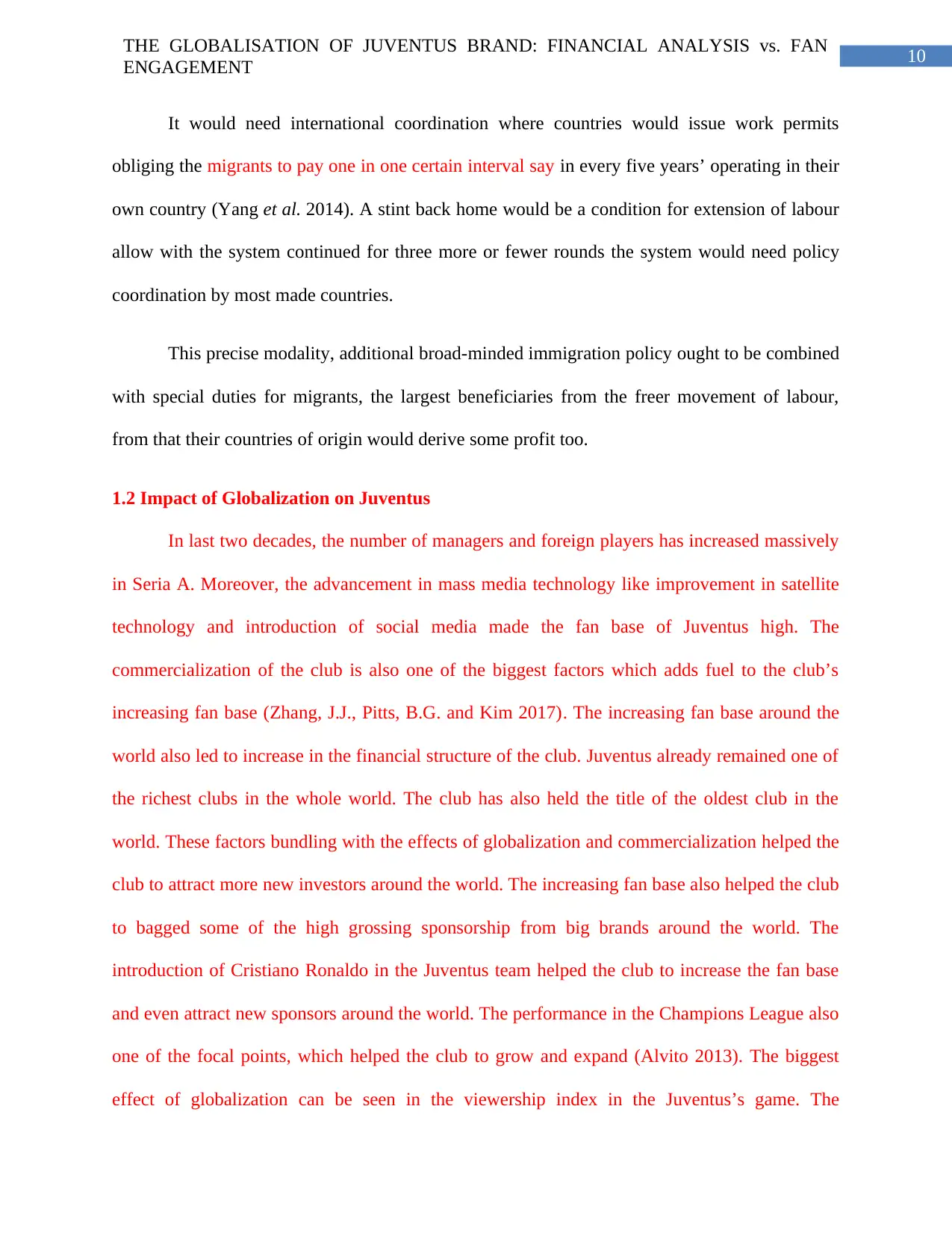
10
THE GLOBALISATION OF JUVENTUS BRAND: FINANCIAL ANALYSIS vs. FAN
ENGAGEMENT
It would need international coordination where countries would issue work permits
obliging the migrants to pay one in one certain interval say in every five years’ operating in their
own country (Yang et al. 2014). A stint back home would be a condition for extension of labour
allow with the system continued for three more or fewer rounds the system would need policy
coordination by most made countries.
This precise modality, additional broad-minded immigration policy ought to be combined
with special duties for migrants, the largest beneficiaries from the freer movement of labour,
from that their countries of origin would derive some profit too.
1.2 Impact of Globalization on Juventus
In last two decades, the number of managers and foreign players has increased massively
in Seria A. Moreover, the advancement in mass media technology like improvement in satellite
technology and introduction of social media made the fan base of Juventus high. The
commercialization of the club is also one of the biggest factors which adds fuel to the club’s
increasing fan base (Zhang, J.J., Pitts, B.G. and Kim 2017). The increasing fan base around the
world also led to increase in the financial structure of the club. Juventus already remained one of
the richest clubs in the whole world. The club has also held the title of the oldest club in the
world. These factors bundling with the effects of globalization and commercialization helped the
club to attract more new investors around the world. The increasing fan base also helped the club
to bagged some of the high grossing sponsorship from big brands around the world. The
introduction of Cristiano Ronaldo in the Juventus team helped the club to increase the fan base
and even attract new sponsors around the world. The performance in the Champions League also
one of the focal points, which helped the club to grow and expand (Alvito 2013). The biggest
effect of globalization can be seen in the viewership index in the Juventus’s game. The
THE GLOBALISATION OF JUVENTUS BRAND: FINANCIAL ANALYSIS vs. FAN
ENGAGEMENT
It would need international coordination where countries would issue work permits
obliging the migrants to pay one in one certain interval say in every five years’ operating in their
own country (Yang et al. 2014). A stint back home would be a condition for extension of labour
allow with the system continued for three more or fewer rounds the system would need policy
coordination by most made countries.
This precise modality, additional broad-minded immigration policy ought to be combined
with special duties for migrants, the largest beneficiaries from the freer movement of labour,
from that their countries of origin would derive some profit too.
1.2 Impact of Globalization on Juventus
In last two decades, the number of managers and foreign players has increased massively
in Seria A. Moreover, the advancement in mass media technology like improvement in satellite
technology and introduction of social media made the fan base of Juventus high. The
commercialization of the club is also one of the biggest factors which adds fuel to the club’s
increasing fan base (Zhang, J.J., Pitts, B.G. and Kim 2017). The increasing fan base around the
world also led to increase in the financial structure of the club. Juventus already remained one of
the richest clubs in the whole world. The club has also held the title of the oldest club in the
world. These factors bundling with the effects of globalization and commercialization helped the
club to attract more new investors around the world. The increasing fan base also helped the club
to bagged some of the high grossing sponsorship from big brands around the world. The
introduction of Cristiano Ronaldo in the Juventus team helped the club to increase the fan base
and even attract new sponsors around the world. The performance in the Champions League also
one of the focal points, which helped the club to grow and expand (Alvito 2013). The biggest
effect of globalization can be seen in the viewership index in the Juventus’s game. The
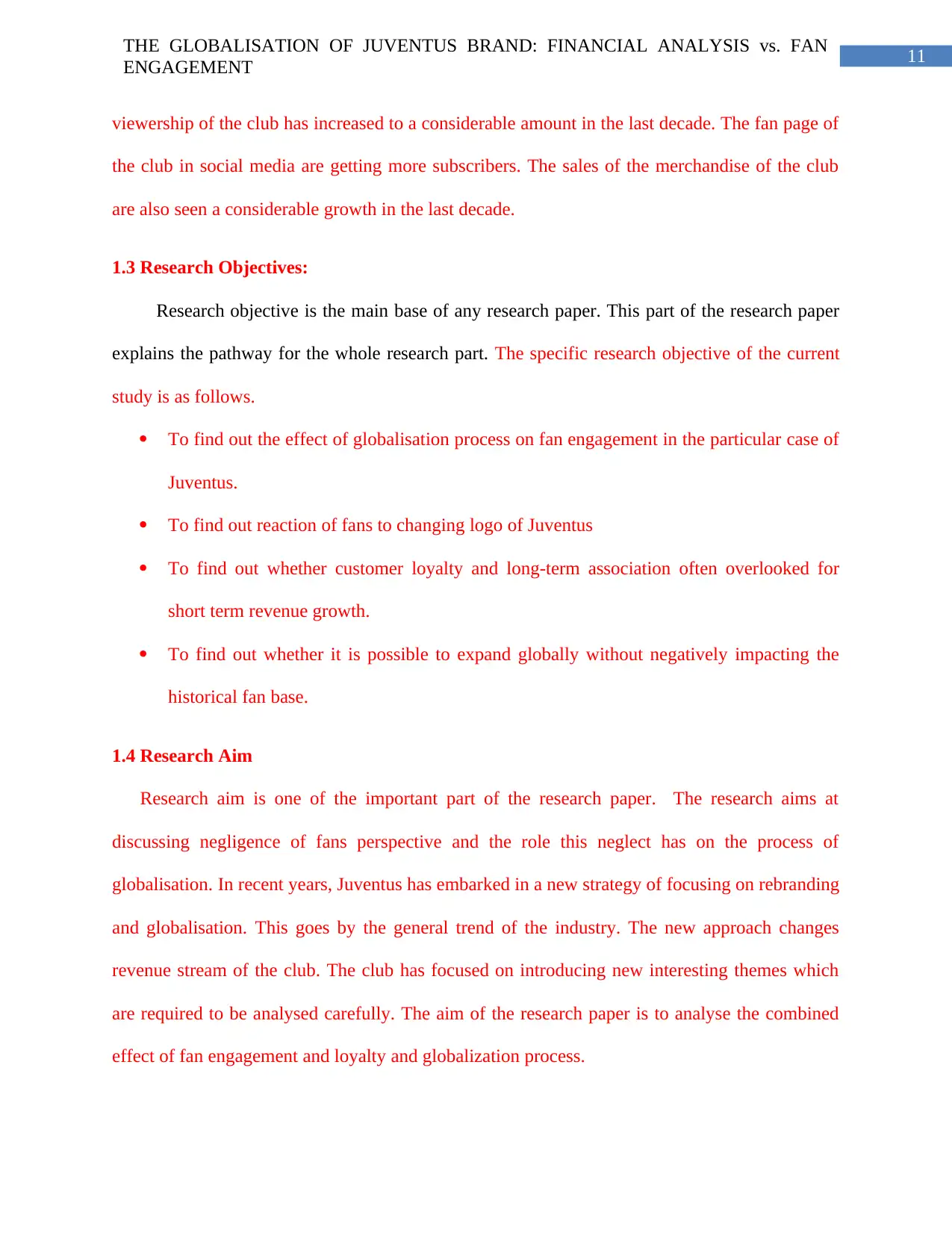
11
THE GLOBALISATION OF JUVENTUS BRAND: FINANCIAL ANALYSIS vs. FAN
ENGAGEMENT
viewership of the club has increased to a considerable amount in the last decade. The fan page of
the club in social media are getting more subscribers. The sales of the merchandise of the club
are also seen a considerable growth in the last decade.
1.3 Research Objectives:
Research objective is the main base of any research paper. This part of the research paper
explains the pathway for the whole research part. The specific research objective of the current
study is as follows.
To find out the effect of globalisation process on fan engagement in the particular case of
Juventus.
To find out reaction of fans to changing logo of Juventus
To find out whether customer loyalty and long-term association often overlooked for
short term revenue growth.
To find out whether it is possible to expand globally without negatively impacting the
historical fan base.
1.4 Research Aim
Research aim is one of the important part of the research paper. The research aims at
discussing negligence of fans perspective and the role this neglect has on the process of
globalisation. In recent years, Juventus has embarked in a new strategy of focusing on rebranding
and globalisation. This goes by the general trend of the industry. The new approach changes
revenue stream of the club. The club has focused on introducing new interesting themes which
are required to be analysed carefully. The aim of the research paper is to analyse the combined
effect of fan engagement and loyalty and globalization process.
THE GLOBALISATION OF JUVENTUS BRAND: FINANCIAL ANALYSIS vs. FAN
ENGAGEMENT
viewership of the club has increased to a considerable amount in the last decade. The fan page of
the club in social media are getting more subscribers. The sales of the merchandise of the club
are also seen a considerable growth in the last decade.
1.3 Research Objectives:
Research objective is the main base of any research paper. This part of the research paper
explains the pathway for the whole research part. The specific research objective of the current
study is as follows.
To find out the effect of globalisation process on fan engagement in the particular case of
Juventus.
To find out reaction of fans to changing logo of Juventus
To find out whether customer loyalty and long-term association often overlooked for
short term revenue growth.
To find out whether it is possible to expand globally without negatively impacting the
historical fan base.
1.4 Research Aim
Research aim is one of the important part of the research paper. The research aims at
discussing negligence of fans perspective and the role this neglect has on the process of
globalisation. In recent years, Juventus has embarked in a new strategy of focusing on rebranding
and globalisation. This goes by the general trend of the industry. The new approach changes
revenue stream of the club. The club has focused on introducing new interesting themes which
are required to be analysed carefully. The aim of the research paper is to analyse the combined
effect of fan engagement and loyalty and globalization process.
⊘ This is a preview!⊘
Do you want full access?
Subscribe today to unlock all pages.

Trusted by 1+ million students worldwide
1 out of 67
Related Documents
Your All-in-One AI-Powered Toolkit for Academic Success.
+13062052269
info@desklib.com
Available 24*7 on WhatsApp / Email
![[object Object]](/_next/static/media/star-bottom.7253800d.svg)
Unlock your academic potential
Copyright © 2020–2026 A2Z Services. All Rights Reserved. Developed and managed by ZUCOL.





